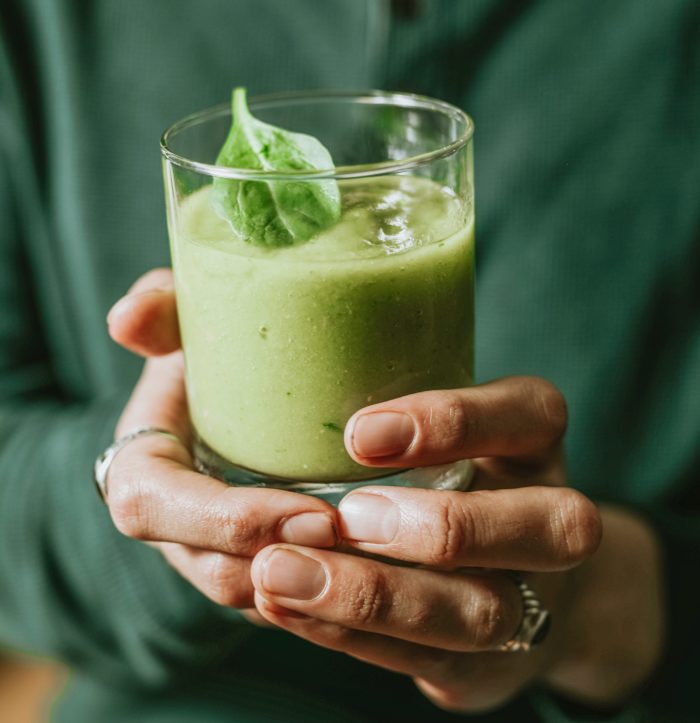
Supermodel Miranda Kerr drinks it every morning. ‘Medical Medium’ Antony Williams claims it will ‘save your life’. But is celery juice really all it’s cracked up to be? I spoke with Dr. Pamela Fergusson (Canadian registered dietician with 15 years of experience, as well as a Ph.D in nutrition) to get to the cold hard facts: looking at scientific, evidence-based information about the celery juice craze.
Why has the celery juice craze been so popular? Dietary fads are nothing new. In 1820, Lord Byron popularized a ‘vinegar and water’ diet – which consisted of drinking (you guessed it) water mixed with apple cider vinegar. The 1930s brought us the grapefruit diet, the cabbage soup diet was popular in the 1950s, whilst more recently, we’ve seen diet or meal replacement shakes, weight loss teas and appetite suppressant supplements. We are always looking for something that’s going to make us feel great – and fast.
Celery juice positives
Celery juice has been a super popular craze in the last year, with many claiming it helps with bloating, weight loss and skin conditions, amongst other things. Dr Pamela reports that celery juice, along with other vegetable juices have a laxative effect, especially on an empty stomach, which may help with weight loss and bloating. Celery juice is also extremely low in calories (8 calories per 100g), and so this is likely to contribute to weight loss too.
Side note: it’s a myth that celery has ‘negative calories’: the idea that it takes more calories for the body to process and digest than the number of calories it contains – but, celery is one of the lowest calorie foods.

Potential side effects
Can there be any problems from drinking celery juice? For a start, it’s important to remember that because celery juice is low in calories, protein, and fibre, you’ll need to make sure you eat enough throughout the day to have enough energy and fuel for your body.
Secondly, celery, along with kale, broccoli and cabbage are one of the vegetables that contain goitrogens. Goitrogens can potentially cause thyroid malfunction and maybe even a goiter (enlarged thyroid). Dr Fergusson explains: “Goitres are big lumps on your neck! Nobody wants that. Please be cautious.” While there is no specific formula for how long this problem might take to occur in each person, we should be aware that daily consumption of celery juice may be risky.
If you’ve read a lot about the celery juice craze, you may have heard some of the claims made by Antony Williams (AKA ‘Medical Medium’: it is important to note Williams sources his nutritional information from ‘the spirit world’, and has no medical or nutritional qualifications). Williams suggests that celery juice holds power in: “Sodium cluster salts – a subgroup of sodium that is undiscovered” which he claims has the power to: “revive your stomach gland, strengthen your digestion and stop protein rotting in your gut…. and kill off pathogens that cause anything from multiple sclerosis and Lyme disease.”
What does Dr Fergusson have to say about these claims? “There is absolutely no scientific basis for this, and it is dangerous.” It’s challenging today to know fact from fiction in the era of ‘fake news’, but the key takeaway of any craze like this is to do your own research, try to look at scientific, peer-reviewed journals, or consult with medical or nutritional professionals such as registered dietitians.

To celery or not to celery?
So should we leave the celery juice entirely? Dr Fergusson reports that fruit and vegetable juices or smoothies can be a great start to the day, providing morning energy, as well as concentrated sources of nutrients including vitamins, minerals and antioxidants.
However, instead of focusing entirely on celery, you can try alternating it with other fruit and vegetable juices and smoothies. While juices are concentrated in nutrients, you get the benefit of fibre from fruits and veggies when you drink them in a smoothie. Fibre is a benefit not to be underestimated: did you know only 3% of Americans get the recommended amounts of fibre (25-35 g a day)? Studies have shown adequate fibre intake protects against numerous health problems and diseases, including: type 2 diabetes, cardiovascular disease, stroke, gastrointestinal diseases and obesity.
The crux of any dietary craze is that many people are keen to lose weight and feel healthier with an easy fix. Dietary crazes and trends are often a distraction from what is well-established in nutrition science. Science has shown that eating a diet consistently rich in fibre from plants, including fruits and vegetables, beans, lentils, nuts, seeds, and whole grains is the healthiest choice. Committing to living a healthy lifestyle (including lots of water, reducing processed food, and staying active) is better for our long-term health and fitness goals, rather than looking for that quick fix.

Also by Kirstie: Paradise Found: Canggu, Bali Is Ubud’s Cool, Hipster Younger Sister You Have To Discover
Practice These 5 Moves To Build Yourself Up To A Headstand (Finally!)
Get more like this—Subscribe to our daily inspirational newsletter for exclusive content!




